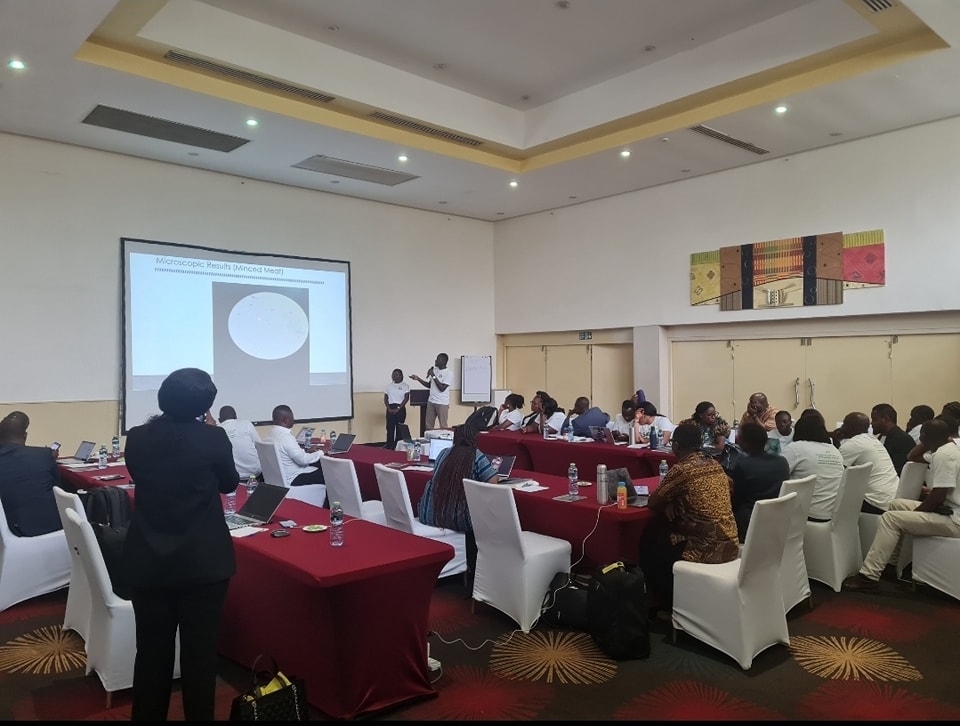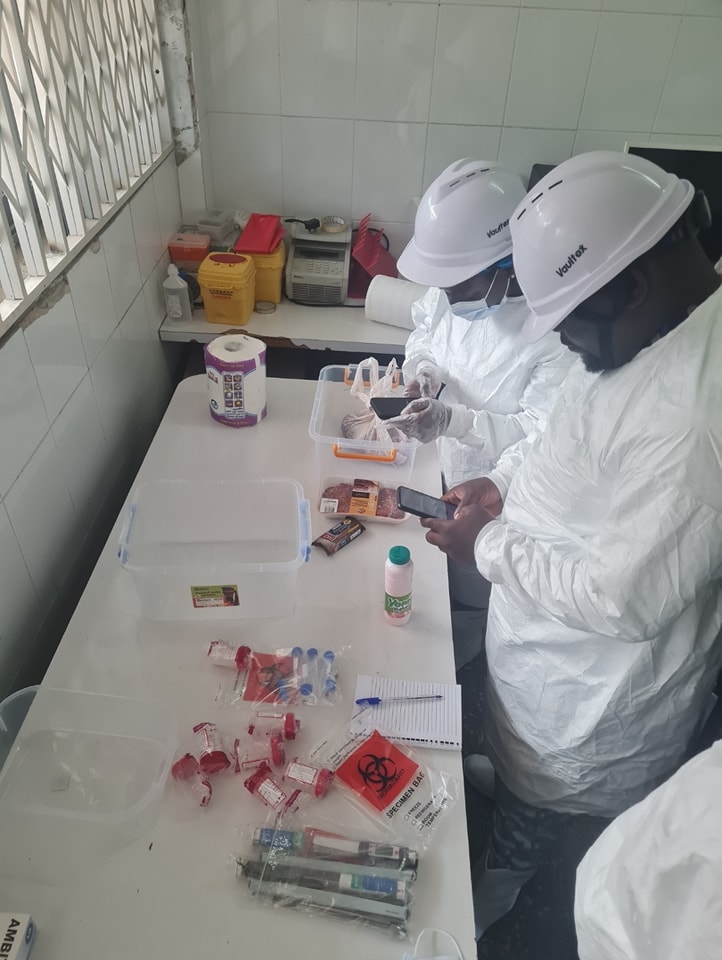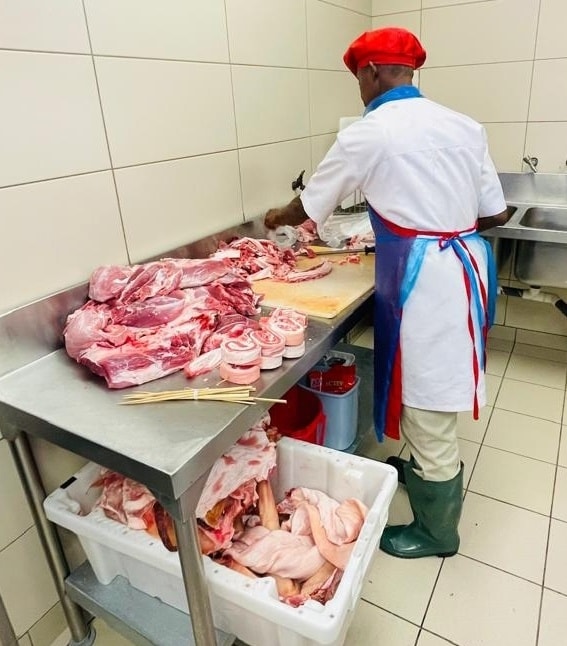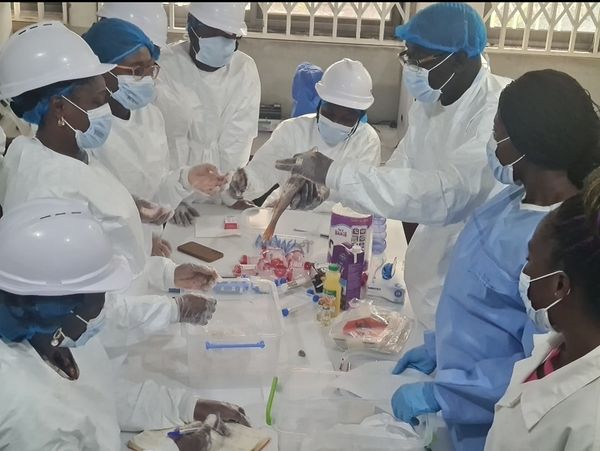“WHERE TRADE & COMMERCE FAIL TO GO, CONFLICTS & HUNGER GO!”-OWUSU-AGYEMAN
-(At ECOWAS/FSRP Exercise on Harmonised Trade & Food Sanitary Standards)
The Economic Community of West African States (ECOWAS), through the West Africa Food System Resilience Programme (FSRP), has trained Ghanaian practitioners and regulators involved in food and agricultural trade, on internationally recognised Sanitary and Phytosanitary Sanitary (SPS) standards, to ensure food safety within the sub region. The key objective of the ECOWAS-led sessions was to create a knowledge acquisition forum for Ghanaian authorities involved in the regulation of food handling standards and those involved in cross-border trade of food and agro-based products. The 2-day exercise also involved training and knowledge-sharing sessions, field inspection visits and practical demonstrations on sanitary inspection and decision-making regarding food-borne illnesses - with a focus on protecting consumers from illnesses, injury or death caused by the consumption of food.

Sanitary and phytosanitary (SPS) measures are quarantine and biosecurity measures which are applied to protect human, animal or plant life or health from risks arising from the introduction, establishment and spread of pests and diseases and from risks arising from additives, toxins and contaminants in food and feed – [Wikipedia]
KEY PLAYERS
The implementing and regulatory bodies were Food and Drugs Authority (FDA), Ghana Standards Authority (GSA), Plant Protection & Regulatory Services Department (PPRSD), the Veterinary Services Department (VSD) of the Ministry of Food & Agriculture (MOFA) and the West Africa Food System Resilience Project (FSRP Ghana).
The trade harmonisation part of the engagements brought together representatives from various associations within the food and agricultural value chain. These included: Associations of Cereal Traders, Livestock Traders, Agro-processors, Transporters Association, Association of Ghana Industries (AGI), Freight forwarders Association, Ghana Revenue, Authority (Customs Division), Ghana Police, Ministry of Trade and Industry/ETLS Focal Point, Sanitary and phytosanitary services at plant protection services, Ghana Chamber of Commerce and Industry, Ghana Shippers Authority and Borderless Alliance-Ghana Chapter.
CRUCIAL ROLE OF ECOWAS
The Project Coordinator of FSRP Ghana, Mr. Osei Owusu Agyeman noted that ECOWAS is mostly known for excellence at mobilising its members for peacekeeping initiatives in the region. However, it’s time to recognise ECOWAS as a body that effectively champions commercial agricultural production and productivity in selected value chains in the region. “Where trade & commerce fail to go, conflicts & hunger go. The very act of promoting trade in food and agricultural produce within the sub region is in itself, a peace-building measure in our part of the world”, he emphasized. Mr. Agyeman further noted that: our cultures and traditions, festivals, meals, among others, are virtually the same. The Volta Basin covers about 25 percent of our land mass, yet its sources are from our neighbour. In the same manner, we also share the same climatic conditions and hazards, such as floods, droughts, pests and diseases that affect our crops and animals. It was for this reason that ECOWAS thought it wise to mobilise its members to join forces to build food resilience in the region. Mr. Agyeman assured the regulators that FSRP, working hand-in-hand with ECOWAS and the World Bank, will do whatever it takes to give them the support they need to competently play their roles as key actors, regulators and inspectors within the FSRP value chains.

TRAINING & KNOWLEDGE SHARING SESSIONS
The engagements focused on ‘The General Principles of Food Hygiene’, ‘SPS Agreements’, ‘Risk Analysis’, ‘the Hazard Analysis Critical Control Point (HACCP)’, ‘Food Import & Export Inspection & Certification Systems’, ‘The Legislative & Regulatory Framework in Force in Ghana’ and ‘The Harmonised Sanitary Inspection & Decision-Making Guide’.

FIELD INSPECTION VISITS & PRACTICAL DEMONSTRATIONS
These were followed by field inspection visits for the sanitary inspection of imported products (like canned and fresh products - dairy and meat); sanitary inspection of products intended for export; and sanitary inspection of local products (like meat, fish and other fresh products).
The regulators carried out product identification; physical inspection of products; detection and identification of signs of non-conformity, non-healthy products; techniques for collecting, identifying, and packaging of samples for further analysis at the laboratory.
The facilities visited were Johnny’s Food & Meat Complex (a slaughterhouse in Accra) and Shoprite (a groceries supermarket), where the regulatory officials applied facility and product inspection procedures, including the collection of samples for in-depth inspection at the laboratory in line with production conditions, storage conditions, handling, warehousing, packaging, labelling and safety standards. The samples were tested for the presence of bacteria. It was concluded with decision-making and justification.
The facilitators of the exercise were Justin Baya Bayili (ECOWAS), Abasse Tchadouwa (ECOWAS), and Dr. Cheikh Fall, a Consultant. They shared vital knowledge in the elimination of obstacles to trade in agro-pastoral products and the harmonisation of sanitary protocols in the safe handling of food and agro products. Dr. Fall also introduced the team to the new harmonised risk-based sanitary and phytosanitary guide developed by ECOWAS, to harmonise the protocols across the country.
The Environmental Specialist of FSRP, Ms Emelda Adii, thanked ECOWAS for coordinating the exercise, and the Ghanaian regulating bodies for their active participation. She assured both teams that, as pledged by the Project Coordinator, FSRP Ghana is determined to work hand-in-hand with them to ensure that Ghana plays its inalienable role to sustainably promote the adoption of safe food handling practices in the sub-region. She said the FSRP Integrated Pest Management Plan (IPMP) will be a guiding document to achieve this objective.
OVERVIEW
The efficient transportation and marketing of community-originating agricultural and livestock products are adversely affected by obstacles that include the non-application of mutually recognised phytosanitary protocols along trade corridors, thereby slowing down the movement of these products from the point of production to consumption. Other obstacles include bogus charges or illegal collections, numerous checkpoints, and long stops at mobile checkpoints (customs, police, gendarmerie, water and forestry, transporters' unions, etc.). These obstacles lead to unnecessary delays which largely affect the quality of foods before they arrive at their destination markets to be sold to consumers.
Also, the lack of professionalism on the part of those involved, often reflected in the absence of documents on loads, the non-compliance of means of transport, and the use of the harmonised phytosanitary requirements, are factors that create barriers and increase the cost of production at the destination. The lack of gender sensitive infrastructure at the borders is also a key challenge that critically affects cross-border trade, especially for women, who constitute about 70% of the traders that use the borders.
With support of the World Bank, FSRP is harmonising regional agricultural trade policies on critical food system resilience issues in order to reduce trade barriers and harmonise sanitary and phytosanitary standards of agricultural products. It is within this framework that the World Bank, through FSRP, in collaboration with the ECOWAS Commission, organised the national sensitization workshop in Accra, Ghana.
ABOUT FSRP
The West Africa Food System Resilience Programme (FSRP) is a World Bank funded program, promoted by ECOWAS for participating countries. It is to strengthen food system risk management, improve the sustainability of the agricultural productive base and harmonize agricultural markets in the West African sub region. Participating countries include Burkina Faso, Mali, Niger, Chad, Sierra Leone, Togo and Chad. In Ghana, FSRP which is being implemented by the Ministry of Food & Agriculture, is focusing on the intensified production, marketing and consumption of wholesome Rice, Maize, Broiler Poultry, Soyabeans (for the poultry) and Tomatoes.


Leave a comment
Comments (0)
No comments yet. Be the first to comment!